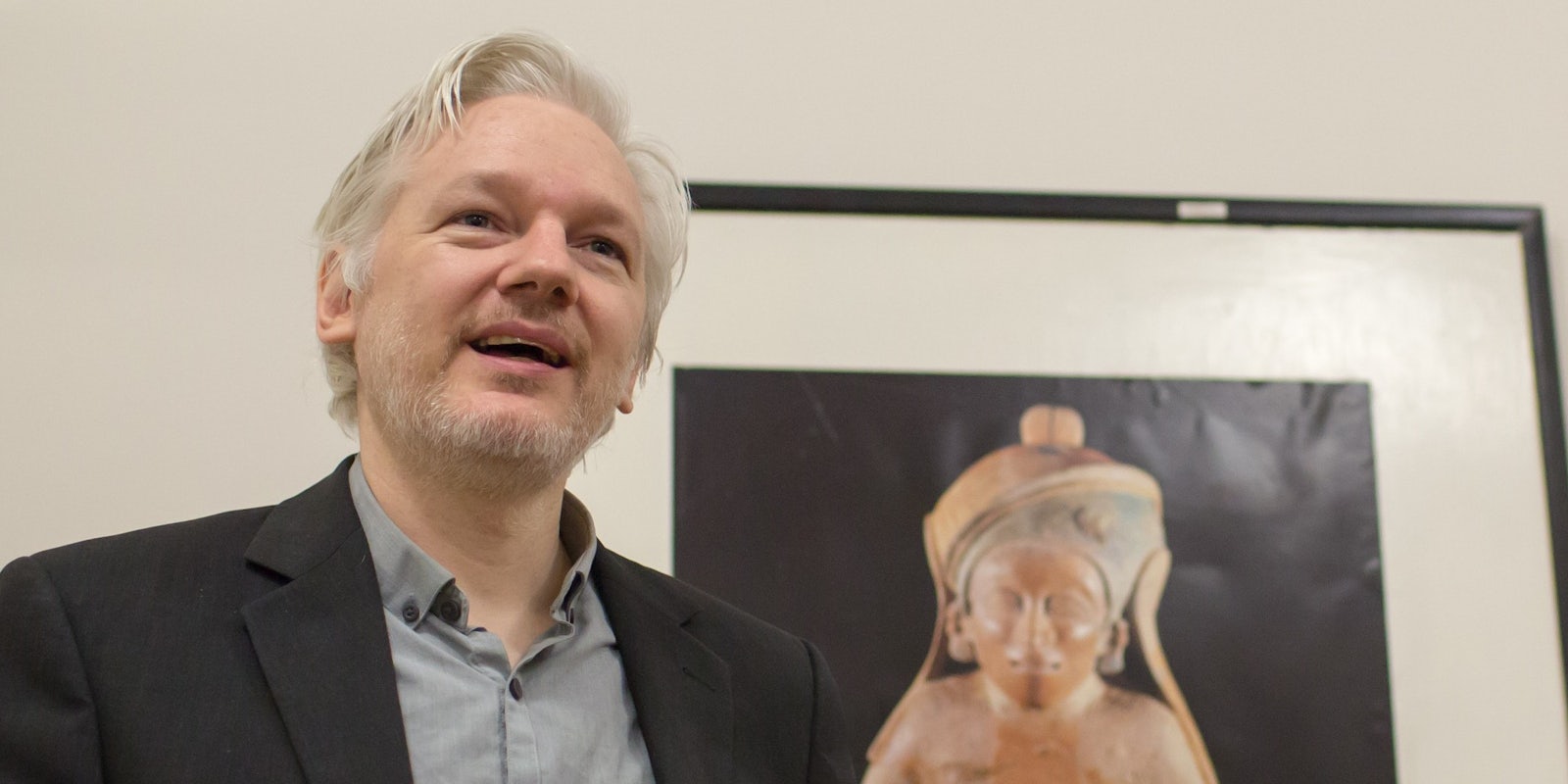Julian Assange is not dead, but his internet connection apparent is.
Late Sunday night, WikiLeaks tweeted a trio of cryptic messages that sent observers into a frenzy of speculation, with many wondering whether the organization’s founder had died or been murdered.
pre-commitment 1: John Kerry 4bb96075acadc3d80b5ac872874c3037a386f4f595fe99e687439aabd0219809
— WikiLeaks (@wikileaks) October 16, 2016
pre-commitment 2: Ecuador
— WikiLeaks (@wikileaks) October 16, 2016
eae5c9b064ed649ba468f0800abf8b56ae5cfe355b93b1ce90a1b92a48a9ab72
pre-commitment 3: UK FCO f33a6de5c627e3270ed3e02f62cd0c857467a780cf6123d2172d80d02a072f74
— WikiLeaks (@wikileaks) October 16, 2016
Seven hours later, a tweet clarified that Assange’s internet connection had been “intentionally severed” by an unnamed “state party.” WikiLeaks later said Ecuador was behind the internet connection interference.
Julian Assange’s internet link has been intentionally severed by a state party. We have activated the appropriate contingency plans.
— WikiLeaks (@wikileaks) October 17, 2016
The claim of a severed internet connection comes amid the ongoing release of thousands of emails stolen from John Podesta, campaign chairman for Democratic presidential nominee Hillary Clinton. Supporters of Clinton’s Republican rival, Donald Trump, speculate that the Clinton campaign or the Obama administration are behind Assange’s allegedly severed internet connection.
The U.S. government recently blamed the breach of Democratic Party entities—including the Democratic National Committee, emails from which WikiLeaks published this summer—on the Russian government. Podesta also claims that Russian operatives were behind the leak of his emails. Last week, White House Press Secretary Josh Earnest said the U.S. was preparing a “proportional response” to the allegedly Russian cyberattacks.
A State Department spokesperson said she would check if the department planned to comment. The White House did not respond to a request for comment. The Clinton campaign refused to comment on speculation that it had a role in the disruption to Assange’s internet connection.
Assange is currently housed at the Ecuadorian embassy in London, where he has lived since August 2012 amid an inquiry by Swedish authorities into claims of sexual misconduct against him. Assange applied for asylum at the embassy due to concerns that traveling to Sweden to answer law enforcement questions would result in his extradition to the United States. He has not been charged with any crimes in the U.S.
The Ecuadorian embassy would not answer questions about Assange or his internet connection over the phone. Our email requesting comment and confirmation of disruption to Assange’s internet connection did not receive an immediate response.
As Gizmodo reports, the “pre-commitment” tweets are likely part of a strategy known as a “dead man’s switch,” which would release encrypted files in the event of the person in question being killed or otherwise incapacitated. WikiLeaks published three such “insurance” files—together equalling some 400GB of data—in 2013.
The claim of a severed internet connection comes roughly two weeks after Assange canceled an announcement at the embassy reportedly due to “security concerns.”
It also came just hours after actress and animal rights activist Pamela Anderson visited Assange at the London embassy. Anderson apparently brought Assange lunch. While the visit sparked speculation of foul play, it is unlikely the two events are connected.
Update 2:43pm CT, Oct. 17: WikiLeaks says Ecuador, the country whose embassy he’s living at, was the state actor that cut Assange’s internet connection.
We can confirm Ecuador cut off Assange’s internet access Saturday, 5pm GMT, shortly after publication of Clinton’s Goldman Sachs speechs.
— WikiLeaks (@wikileaks) October 17, 2016


